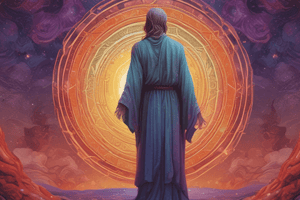Podcast
Questions and Answers
According to Erich Fromm, religion is an expression of our basic human ______, and all cultures will always have it.
According to Erich Fromm, religion is an expression of our basic human ______, and all cultures will always have it.
needs
Humans, as journeying beings ‘_homo _______’ always seeks to find something – or Someone – greater than themselves.
Humans, as journeying beings ‘_homo _______’ always seeks to find something – or Someone – greater than themselves.
viator
The notion of '______ experience' refers to the day-to-day experience of God in ordinary life.
The notion of '______ experience' refers to the day-to-day experience of God in ordinary life.
religious
From the beginning of human civilization, religion has always been a vital ______ of the human condition, providing a system of orientation.
From the beginning of human civilization, religion has always been a vital ______ of the human condition, providing a system of orientation.
Logical thinking invariably leads to the concept of a maker, commonly identified as ______, underpinning the establishment of countless religions.
Logical thinking invariably leads to the concept of a maker, commonly identified as ______, underpinning the establishment of countless religions.
Flashcards
Religion
Religion
A tool used to answer existential questions related to life and existence; a system of orientation that dictate how we should live, and what we should die for.
Homo Viator
Homo Viator
The idea that humans always seek to find something greater than themselves.
Religion (Fromm's View)
Religion (Fromm's View)
An expression of our basic human needs that will always be present in all cultures.
Religious Experience
Religious Experience
Signup and view all the flashcards
Religion & Society
Religion & Society
Signup and view all the flashcards
Study Notes
- Religion is a vital part of human life and is a tool for answering existential questions about life and existence.
- Since the beginning of civilization, religion is a component of the human condition by providing a system of orientation.
- Religion functions as an anchor at the core of humanity's existence by providing meaning for daily life.
- Humans, as journeying beings 'homo viator' seek something or Someone greater than themselves.
- Logical thinking leads to the concept of a maker, often identified as God resulting in countless religions over time.
- Erich Fromm argued that religion expresses basic human needs, and all cultures will have religion which is an inevitable truth.
- Religions have affected present lives, both in good and bad ways, and religion once became the end-all in the western narrative.
- ”Religious experience" is the day-to-day experience of God in ordinary life.
- Everything should be seen as manifestations of something greater than ourselves, making religious experience a daily occurrence.
- God should be experienced daily with the way one experiences God not to be discounted, even in ordinary things.
- Spirituality should be treated in the simple way of life of an ordinary believer, not in a strict, monastic sense.
- Religion, religious experience, and spirituality must be understood with care, as a misstep can lead in the wrong direction. Religion, when properly understood, can transform the believer and move society forward.
- Every religion contains transcendence and a vision of searching for the deepest values of humanity through an authentic connection with the Supreme Being or God.
Religion Etymology
- The etymology of "religion" has controversy and little clarity.
- Cicero proposed the Latin relegere, roughly meaning “to read or go through again in speech or thought."
- The most commonly accepted etymology is the Latin religare, which means “to bind".
- Cicero and other early etymologists share the idea that religion binds a person to social, moral, and legal duties.
- Definitions of religion only provide a nominal meaning and does not give a full understanding of the religion concept.
Religion Defined
- Immanuel Kant stated that “religion is the recognition of all our duties as divine commands," with religion never separated from ethics.
- Emile Durkheim described religion as a set of ceremonial actions assembling the group, heightening emotion, and focusing members on symbols of common belongingness.
- Karl Marx calls religion the “opium of the masses”.
Fundamental Features of Religion
Cosmological Dimension
- Religion is an avenue to answer big questions about existence by providing explanations about faith, universe, creation, nature, meaning, and the place of humanity.
- Religion puts meaning into the world through myths, theories, and visions of the creation, nature, meaning, and forms of the universe.
Soteriological Dimension
- Religion offers a scheme for salvation with most having a soteriological dimension.
- Religion tries to answer: “what happens after death?" and how to have a good destination.
- Heaven and earth is for Christians, samsara and moksha is for Hindus, and nirvana is for Buddhists.
Anthropological Dimension
- Religion teaches how to live together and that there is more than this mundane world.
- Religion encourages seeking beyond human experience and aspiring for what is greater.
Symbolic Dimension
- Religions have symbols and rituals.
- Symbols are signs used for sacred objects to give meaning to human behavior.
- Religious rituals and practices are prescribed behaviors with intended outcomes for the enrichment of the religion and the person.
- Symbols and rituals create a sound tradition and transform through religious tradition, e.g. cross for Christians, “om” for Hindus, and male circumcision of Jews.
Moral Dimension
- Religion provides moral compasses in the sense that there is a right way to live and act in the context of morality.
- To live a moral life is to live out the religion's precepts, with the ideas of good and evil providing moral guidance.
- The major religions vary in their definitions of what constitutes a good life, and the line between moral philosophy and religion is unclear.
Organizational Dimension
- All religions recognize an authority where religious matters are often settled by religious authorities.
- Most religions are headed by priests or pastors who undergo years of training.
- Other religions emphasize internal authority and personal understanding of living in the world.
Theological Dimension
- Religions introduce the existence and nature of a supreme being.
- God is the primary object of all religious practice.
- Understanding a religion involves the knowledge and appreciation of the supreme being.
- All forms of religious devotional systems are considered expressions of the divine.
Religious Experience
- Religious experience and what experience is considered religious with questions lingering around the concept.
- Religious may refer to divinity, holiness,sacredness but also in terms of a set of beliefs.
- Experience is something that occurs in life often personal or subjective.
- A religious experience is a personal experience that pertains to an encounter of the Sacred within a religious framework which therefore, is an experience of God.
- William James distinguishes religious experience for being transcendental and that it blocks everything away when experiencing it.
- Transcendental means that it takes one away from a normal physical experience by making you feel connected to the divine.
- Religious experiences blocks everything away to focus your attention on that particular experience.
- Since science and technology is greatly advanced in modern society, encountering something religious is more challenging than it was hundreds of years ago.
- Religious experiences are sometimes impossible to understand which can is an issue with our limited minds.
- Rudolf Otto suggests religious experience is something that is not readily available to everyone.
- It is not about recognition but recognizing it more for the consequences it brings.
Spirituality
- Spirituality is concerned with the problems connected with the spirit or soul, presupposing that humans are embodied spirits composed of body and spirit.
- Sawan Ashram suggests spirituality is the science of developing higher consciousness in Man on the level of the soul.
- Transcendence shifts from bodily consciousness into cosmic consciousness, enabling one to understand the workings of the divine plan.
- Spirituality is NOT:
- Similar to spiritism, or spirits existing apart from matter which leads to ghosts.
- The same as Spiritualism, of the survival of the human personality and communication between the living and the dead.
- Mesmerism, an activity made to leave subjects dazed and subordinate.
- Hypnotism.
- Similar to religiosity, religiosity deals with man-made, external,visible religion, tradition, and beliefs
- Spirituality can exist without religion in order to pursue spiritual growth. Both religiosity and spirituality grow more if they are practiced together as a better trend.
- Spirituality improves religiosity whereas religiosity can also support spirituality.
Summary and Conclusion
- Attempts to explain concepts such as religion, religious experience and spirituality has been done with the goal to learn there are many ways to define each concept.
- Opening one's mind is necessary to understand them properly.
- Studying religion is hard and more technical than it seems but with proper discussion and study, the concept will become clear.
Studying That Suits You
Use AI to generate personalized quizzes and flashcards to suit your learning preferences.




